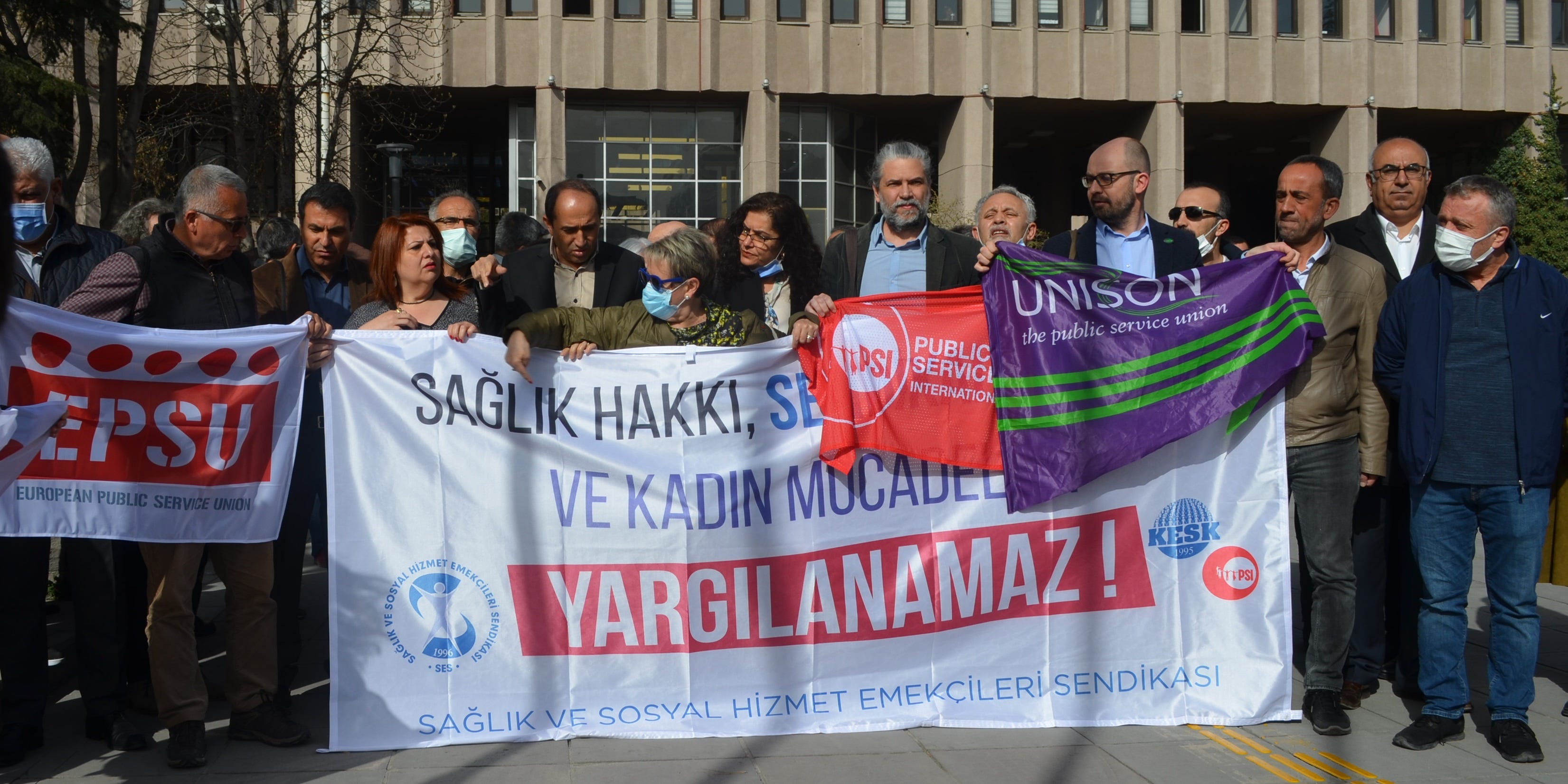Erdoğan’s witch-hunt against (Kurdish) healthcare workers in “Türkiye” continues
Scandalously fabricated accusations by a sold-out judiciary keep workers in prison for as long as possible — like Gönul Erden, in jail since 22 September 2021, and Selma Atabey, who has just been arrested last 4 July for “breach of bail conditions”
by Marcelo Netto

A week after Erdoğan got what he wanted from Finland and Sweden to give his assent for them to join NATO — the heads of dozens Kurdish activists living in both countries on a platter — , the man who rules the country recently renamed “Türkiye” can claim another “victory” for Ankara. Once again, against the Kurds. This time, against trade unionists.
On 4 July, Gönul Erden, former co-president of PSI affiliate SES (the Trade Union of Public Employees in Health and Social Services), who has been in prison since 22 September 2021, found out she will not return home (at least) until 3 October. The same goes for Selma Atabey, current SES co-president, who was arrested in the morning of the same day for “breach of bail conditions”. Both are Kurdish.
Officially, the charges are related to the critical position the union has taken over the handling of the pandemic by the government of Turkey— close to 100.000 people have died including over 500 health workers. But, after listening to the judge’s questions during the various hearings, this has proven to be only an alibi for including accusations prior to Covid-19 — dating back 10 to 15 years.
All accusations are from the same anonymous informant, who has apparently testified against hundreds. The strategy of the prosecution is to try to force a link between the union work carried out by SES and the PKK — the Kurdistan Workers’ Party, designated as a terrorist organization by Turkey. Whether it be the transfer of money to certain projects to aid poor Kurdish communities or the accusation that SES is a front trade union for “terrorist actions” — including guerrilla training for its members in Kurdish camps in Iraq.
Social media posts such as a photo in which Gönul, a nurse since 1998, appears at her sister’s wedding in England holding a cloth with Kurdish colours (red, yellow and green) or even a book found in her home written by Abdullah Öcalan — a founding member of the PKK — are part of the “proofs” presented by the prosecution.
Gönul’s attendance at the PSI World Congress in 2017 in Geneva has also been brought up as an indication of the international ramifications of her activities on behalf of the Kurdish resistance.
For her part, Selma, a nurse since 1995, who is facing 12 concomitant lawsuits — one of them to be banned from serving as SES co-president — is accused, among others, of having been seen receiving training to learn how to use a Kalashnikov.

“Covid has increased the visibility of the work done by SES, which has led to a significant increase in the number of members. Today, we are around 30,000; 6,000 [members] having joined just last year. So, I see these processes as a counterattack by the government to undermine the population’s trust in us, health workers,” says Selma.
But Gönul and Selma are not alone. Another six former SES Executive Committee members are listed in this same file: Fikret Calagan, Bedriye Yorgun, Belkis Yurtsever, Rona Temelli, Ramazan Tas and Erdal Turan — all of them (Kurdish) were arrested for several days, in May 2021, but were released following international political pressure.
Countless trials
Erdoğan’s persecution against SES dates back a long way. PSI, EPSU and Unison have been attending countless trials against its members ever since Erdoğan — elected president in 2014 — served as Prime Minister of Turkey, from 2003 to 2014.
In 2016 alone, over 2,000 SES members were laid off for “disrupting the civil order”. In addition, more than a hundred SES members are currently facing trials all over the country.
The fact that 70% of SES members are Kurds cannot be ignored. The same goes for its work with the Kurdish communities, deprived of receiving health assistance on their own language — which is prohibited in Turkey.


“The Covid pandemic turned out to be a great pretext for the government to accuse SES members of receiving and passing on ‘terrorist’ instructions to the Kurdish communities served by these health workers,” points out Osman Isci, who works in the international affairs department of the Confederation of Public Employees’ Trade Unions (KESK), the national center of which SES is part of.
The aim of Ankara is clear: the longer they manage to keep the SES unionists in prison — despite non existent evidence — , the more chances they will have to try to get scattered information that will lead to building a network of connections among Kurdish activists.
Erdoğan’s systematic persecution of the Kurds, which practically borders on an obsession, finds backing in figures. There are an estimated 25 million Kurds in Turkey, with 5 million in Istanbul alone and 700,000 in Ankara — representing about 25% of the country’s total population.
There is also a symbolic, but no less potent, fact that makes Erdoğan hate SES: the leadership role that women play in this trade union founded in 1996 — which can be glimpsed in its unprecedented co-presidency system (with the position always being held by a woman and a man), something that would come to be copied by other trade union organisations in the country.

“The law is the word of one man”
All this has been possible because Erdoğan has created his “own court” and systematically expels judges who do not concur with his views of a new “Türkiye” — the country’s recent name change is Erdoğan’s latest card to solidify his Neo-Ottomanism ideology. Instead of the “rule of law”, the Turkish judicial system now is guided by the so-called “Criminal Enemy Law”.
The life sentence imposed on Osman Kavala last 25 April 2022 speaks by itself. The verdicts stem from weak allegations that Kavala was behind the Gezi Park protests in 2013 and played a role in the 2016 attempted military coup in the country. Erdoğan says Kavala is a leftist agent of George Soros, the Hungarian-born US billionaire, which combined with his reportedly good relationship with Öcalan makes him the “perfect enemy”.
During his trial, Kavala’s lawyers emphasised he was not even asked if he was in Gezi Park; and a representative of an association defending free speech asked the judges to “leave their mobile phones” to listen to the defence, suggesting that they were receiving instructions. Amnesty International called the decision “a travesty of justice”, calling the trial “a politically motivated charade”. At the time, Kavala denounced Erdoğan’s influence on his trial to the court.
If anything more was needed, the 2016 failed military coup gave Erdoğan “carte blanche” to label 1,5 million public sector workers as “terrorists”, who since then have been detained, suspended or put under investigation.
“If I were indeed a terrorist why was I then not dismissed in 2016 during the ‘state of emergency’?”, asks Gönul (that means “heart” in Turkish) to the judge? “If I were indeed a terrorist what was I doing working in a public hospital in 2021 when, after contracting Covid, I ended up infecting my mother? Who passed away when I was already in jail?”
